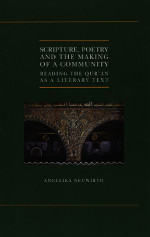|
|
| |

|

|
Neuwirth A. Scripture, Poetry and the Making of Community. Reading the Qur'an as a Literary Text. Oxford University Press in association with the Institute of Ismaili Studies, London, 2014.
This volume presents the views on the Qur’an by Professor Angelika Neuwirth, one of
the leading scholars in Quranic studies today. It contains fourteen articles that reflect
her original thought on the topic as developed over thirty years of research. The book
consists of a mixture of new as well as previously published pieces, some of which are
translations from the German while others are articles originally written in English.
Thus, for the first time, Prof. Neuwirth’s scholarship on the Qur’an is presented to a
global audience in English in a comprehensive way.
In Prof. Neuwirth’s view, scholars are used to understanding the Qur’an as the ‘Islamic
text’ par excellence, an assumption which, when viewed historically, is far from evident.
More than twenty years before it rose to the rank of Islamic scripture, the Qur’an was
an oral proclamation addressed by the Prophet Muhammad to pre-Islamic listeners,
for the Muslim community had not yet been formed. Those listeners might best be
described as individuals educated in late antique culture, be they Arab pagans familiar
with the monotheistic religions of Judaism and Christianity, or syncretists of these
religions, or learned Jews and Christians whose presence is reflected in the Medinan
suras. The interactive communication process between Muhammad and these groups
brought about an epistemic turn in Arab Late Antiquity: with the Quranic discovery
of writing as the ultimate authority, the nascent community attained a new ‘textual
coherence’ where scripture, with its valorisation of history and memory, was recognised
as a guiding concept. It is within this new Biblically imprinted world view that central
principles and values of the pagan Arab milieu were debated. This process resulted in a
twin achievement: the genesis of a new scripture and the emergence of a community.
Two great traditions, then, the Biblical, transmitted by both Jews and Christians, and
the local Arabic, represented in Ancient Arabic poetry, appear to have established the
field of tension from which the Qur’an evolved; it was both scripture and poetry which
had produced and shaped the emerging Muslim community.
 PDF-файлы PDF-файлы
Annotation, Contents, Acknowledgements, Introduction
Ключевые слова
Коран
|
|
|
|
Случайная новость: Объявления |
|
11 марта в 13.00 состоится обсуждение плановой работы Ольги Михайловны Чунаковой «Глагол в согдийском языке (рукописи из Восточного Туркестана и Дуньхуана в собрании ИВР РАН)». |
|
Подробнее...
|
|
|
|
|

